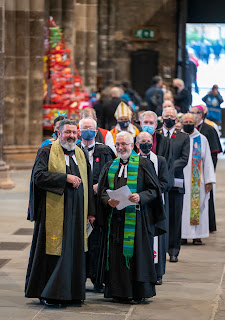I really enjoyed reading Ian Galloway's Called To Be Friends: Unlocking the Heart of John's Gospel, and found his approach both refreshing and fascinating. He conjures up a sense of excitement at what Jesus does - "Jesus loves people. He is irrepressible. You can’t turn a page in the Gospel without meeting someone experiencing a life-changing encounter with Jesus."
The matter of how we can relate to Jesus is central to Galloway's concern. He puts it like this - "Discovering that Jesus knows you is a very exciting moment. Suddenly, nothing is hidden. He can see around the corners of your heart. He can see the good that sits inside you. He can see the potential that is in you, which others have not yet seen. He can also see where things have gone horribly wrong. No one enjoys that sort of stuff coming out into the light, but Jesus has a gentle way of insisting that it does. He is able to create the safe spaces where our past failures can get not just painfully re-examined but also resolved and healed."
I love the way in which he explores the stories and incidents that John records, how they relate to each other, and how we might link them with stories in what we usually call the Old Testament. But I particularly like the way in which he brings us in as participants. So, for example, he writes of the story that we would likely name as the feeding of the five thousand - "Imagine being part of that. Imagine being given half a loaf and five hundred plus people to feed. How would you handle that? How much would you give to start with? Imagine the strange and fearful joy of seeing that bread in your hand never diminish, no matter how much you break it. In the prayer of Jesus and the hands of Jesus and his disciples, the breaking of bread is the multiplying of bread. What Is the Outcome? (6:12–13) An abundance. A shortage is turned into a massive surplus. People take it home with them for tomorrow’s lunch."
And I do like his reflections on leadership and the way in which he links those to the end of Jesus' earthly life - "Making mistakes is part of leadership development in Jesus’ world. Failure is not the problem. It is what you do next that counts. If you are a leader already, try not to get too big-headed about it. You are only following Jesus, just the same as everyone else. There are two men in this final story. One is invited into a very high-profile leadership role. The other is invited to look after Jesus’ mum. You can make your own mind up about whether one is more significant than the other."
